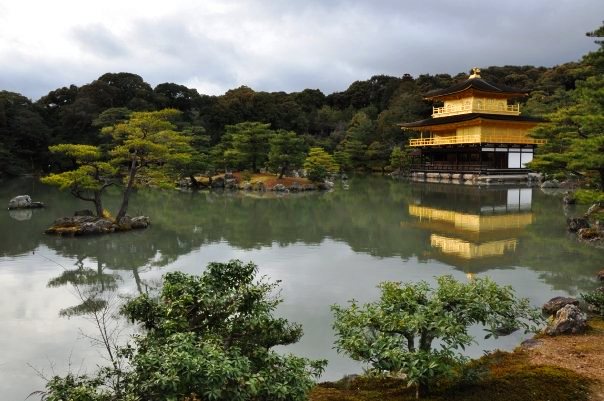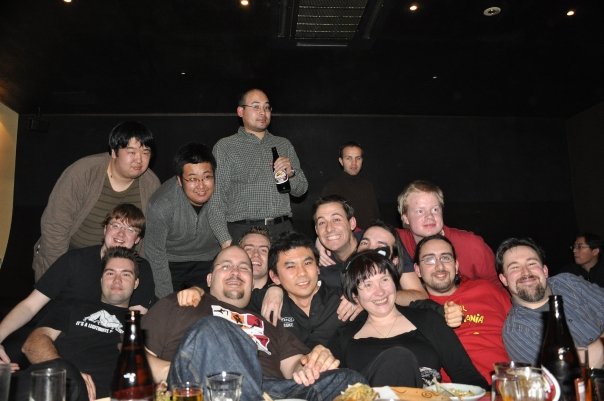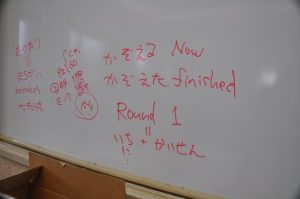Pro Tour Kyoto ’09 Report — How to Overcome the Cultural Barrier
When the ’09 Pro Tour schedule was released it seemed clear what my next destination was. Travelling to Japan has been on my mind for quite a long time, and now I just had the opportunity to be there, to immerse in a really different culture, to see all the wonders I looked up so many times on the internet, and… well, to judge a Pro Tour!

After being accepted for the Pro Tour as a volunteer, convincing a few friends to come along was the easy part. Jorge Alarcón, who used to be a judge some time ago; Daniel Mencía, level 1 judge from Madrid; and Daniel’s girlfriend Ana Maíllo were my partners for the Japanese adventure. We made all the necessary arrangements and there we were, taking trains, visiting wonderful temples and castles, enjoying delicious food (cheaper than what I expected!), wandering around… it was such a great time and I just loved every minute I spent in Japan.
The Pro Tour was also very interesting. I met new friends, talked again to old ones, attended some seminars, worked on the main event, shared teams with some of the greatest judges in the program, and chatted with high level judges. I learned so much and I did a lot of different stuff during the weekend. As a judge the experience was absolutely worthwhile.

But there was more to Pro Tour Kyoto – there were a lot of Japanese judges!
Japanese are different, or at least that’s what Westerners think most of the time, but in Japan we Westerners are the different ones.
Japan has been virtually isolated from the rest of the world for most of its history, and the result is a unique cultural heritage. Japan is a vertical society where hierarchy is everything, and all aspects of Japanese life are governed by strict rules of etiquette; for example, to address people who differ on status a different language is used. In Japan group cohesion is prioritized over individual aspirations. Japanese are educated to think of themselves as a part of a group, and their group as a whole is the one who deals with other groups. This is known as the Uchi-Soto (Us and Them) concept.
This group cohesion concept is similar in the DCI, where the group has a much higher priority than the individual. That’s a positive thing because it means each individual wants the group to grow instead of being selfish and only caring about personal development. On the other hand, when relating to hierarchy and interpersonal communication the DCI is different because every judge can interact with each other. Independent of level, each judge can help any other judge; the hierarchy in the DCI shouldn’t be seen as a communication-blocking aspect.
So there was the challenge, a foreigner being part of the “Soto” group looking forward to work with all those Japanese judges. My first opportunity to do so was on Thursday, during the Last Chance Qualifier. A frequent misconception is to assume that everybody else in the world speaks English, and that was my first mistake of the weekend: very few of them spoke English, and the ones who did had trouble articulating a full sentence. I endured on my efforts and tried to help whenever I could in basic tournament operations, like moving tables or distributing product. I also tried to answer some calls on the floor, but Japanese players were reluctant to take my rulings and asked for Japanese judges. So it seemed my only purpose there was dealing with non-Japanese players. At this point I almost felt with no purpose, and I thought the Japanese judges paid little to no attention to me and simply went on dealing with their tournament. Again I was wrong, as I found later that weekend they were really aware of my presence.

On Friday I was assigned to Logistics at the main event. John Alderfer was my team leader, and I had the chance to learn a lot from him. Previously I’d never been in Logistics and he explained during the team meeting in a beautifully clear fashion all the work we were going to do that day. He also stressed to me the importance of working relaxed, even in the middle of a difficult situation. I made good use of his advice during the turmoil that was the change of room configuration from constructed play to draft.
On Saturday I was assigned to Public Events where I tried once more to get involved in teamwork and to help on logistics. I even made a couple suggestions to improve the event but… again I was wrong. It is difficult for the Japanese to accept that any individual can express his opinion. There is a leader, and everyone follows him, so my usual approach to teamwork was useless here. They just aren’t as extroverted as most of us are. We even can look rude when compared with their amazing and never-ending politeness. During the weekend I learned how speaking slowly in a lower tone and keeping gestures and body language to a minimum gives great results.
On Sunday I was again on Public Events. I spent more time on seminars and less on the floor, but there was something different going on. When on the floor I was assigned specific tasks, and I was even specifically called by name to deal with problems relating to non-Japanese players, some of the local judges stopped by to discuss rulings that they gave or to chat about policy…
Somehow I was Uchi.
The key here was patience. I realized they of course knew who I was, they remembered I worked at the Last Chance Qualifier in a difficult environment for me. At the end they were considering me a member of the team, they appreciated my work, and they were happy to share their experiences and thoughts. At this point I realized I should have used a more humble approach, and this would have helped “breaking the ice” more quickly and more efficiently. At last, all my work was paying off.
I still had at that time concerns about how a review would be understood since they don’t usually do reviews. I talked to a judge I wanted to review, made sure he understood my review was a way to give advice, a way to help him to be a better judge, and in my opinion it worked out very well. Instilling into the Japanese judge community the benefits of writing reviews is something that needs to be addressed, and here is a clear message: the reviews are not meant to say if a judge is good or bad, the reviews need to be useful for the judge who receives them and for the judge who writes them. They are teaching tools, advice, but not “marks” to track mistakes over time.
In conclusion: The cultural barrier should not be broken, it has to be walked around; we need to find the way to make others feel good having us around. This is about how to put others in a comfortable position when they work with us. Especially when we deal with people from a very different culture we should try to modify our behavior to adjust it to be more similar to theirs; we should get to know and respect their values; we should explain, without being aggressive or imposing, what we do differently and, more important, why we do it differently. We are just the same, we are all judges, just be patient and try not only to put yourself in their shoes, but also to gain an insight into their values and their beliefs. The effort will pay. To overcome the cultural barrier with the Japanese judge community there are bridges that need to be built, and I am sure Pro Tour Kyoto helped setting the foundations.
I want to thank Satoshi Miyamoto, Kenta Kunishima, Kazuya Kawashima, Kaoru Yonemura, and the rest of the Japanese staff for a great weekend. Also a big thank you to Carlos Ho and Riccardo Tessitori for proofreading.
David de la Iglesia, Level 1 (Spain)
